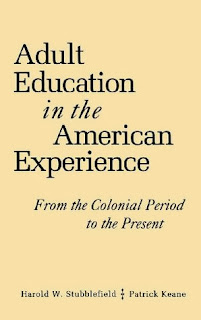Adult Education in the American Experience: From the Colonial Period to the Present
Summary (from the publisher): From the earliest contributions of Native Americans in the colonial period to the workforce preparation crisis in the 1980s, this book explores the patterns, themes, and changing ideologies of learning and education in adulthood.
Review: I read this book as part of my master's program for a class entitled The History of Adult Education. This text moves chronologically from the colonial period to the 1980s to give an overview of the many adult education initiatives that have sprung up around the country. This book is largely an introductory survey of adult education and does a good job of providing a summary and overview of major themes in American history. However, if you are searching for an in-depth look at a particular area of adult education, this book is likely to leave you disappointed.
Each chapter is broken down into dozens of sub-sections that review a particular topic in education from the time period. Part of the difficulty in writing this book is that America is characterized by having a very diverse history. At any given time period, there were hundreds of schools and movements gaining momentum in different parts of the country. It's difficult to do justice to all of them in a book that spans over two hundred years. This issue led to me feeling like the book was a series of descriptions of acronyms of various schools and movements with little depth.
In addition to expected themes like the limited opportunities for women and minorities, it was interesting to see that in America's history, adults have always sought out advanced education as a means of both self-improvement and a way to advance themselves. One trend in education's history I was not familiar with were lyceums, which rose in prominence during the 1820s and featured an "exclusion of politics and religion, a stress on sciences and useful knowledge, development of libraries and museums, and encouragement of temperance and morality" (86). It was also interesting to read about how prominently education by lecture features in our nation's history; "the public platform was a democratic institution in which all could participate regardless of literacy skills or station in life" (136).
Published in 1994, this book could stand to be revised and updated to include more recent history of American Adult Education. Although it cannot provide expansive details about any one subject, it does give a decent overview of the history of adult education in America and serves as an introductory text to the subject.
Stars: 3



Comments
Post a Comment